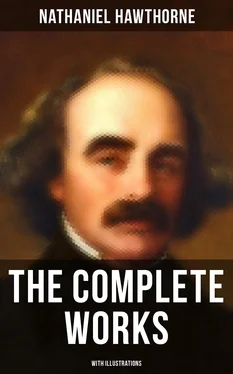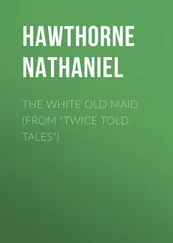“O Hilda, what a treasure of sweet faith and pure imagination you hide under that little straw hat!” cried he, at length. “A Faun! a Faun! Great Pan is not dead, then, after all! The whole tribe of mythical creatures yet live in the moonlit seclusion of a young girl’s fancy, and find it a lovelier abode and play-place, I doubt not, than their Arcadian haunts of yore. What bliss, if a man of marble, like myself, could stray thither, too!”
“Why do you laugh so?” asked Hilda, reddening; for she was a little disturbed at Kenyon’s ridicule, however kindly expressed. “What can I have said, that you think so very foolish?”
“Well, not foolish, then,” rejoined the sculptor, “but wiser, it may be, than I can fathom. Really, however, the idea does strike one as delightfully fresh, when we consider Donatello’s position and external environment. Why, my dear Hilda, he is a Tuscan born, of an old noble race in that part of Italy; and he has a mossgrown tower among the Apennines, where he and his forefathers have dwelt, under their own vines and fig-trees, from an unknown antiquity. His boyish passion for Miriam has introduced him familiarly to our little circle; and our republican and artistic simplicity of intercourse has included this young Italian, on the same terms as one of ourselves. But, if we paid due respect to rank and title, we should bend reverentially to Donatello, and salute him as his Excellency the Count di Monte Beni.”
“That is a droll idea, much droller than his being a Faun!” said Hilda, laughing in her turn. “This does not quite satisfy me, however, especially as you yourself recognized and acknowledged his wonderful resemblance to the statue.”
“Except as regards the pointed ears,” said Kenyon; adding, aside, “and one other little peculiarity, generally observable in the statues of fauns.”
“As for his Excellency the Count di Monte Beni’s ears,” replied Hilda, smiling again at the dignity with which this title invested their playful friend, “you know we could never see their shape, on account of his clustering curls. Nay, I remember, he once started back, as shyly as a wild deer, when Miriam made a pretence of examining them. How do you explain that?”
“O, I certainly shall not contend against such a weight of evidence, the fact of his faunship being otherwise so probable,” answered the sculptor, still hardly retaining his gravity. “Faun or not, Donatello or the Count di Monte Beni — is a singularly wild creature, and, as I have remarked on other occasions, though very gentle, does not love to be touched. Speaking in no harsh sense, there is a great deal of animal nature in him, as if he had been born in the woods, and had run wild all his childhood, and were as yet but imperfectly domesticated. Life, even in our day, is very simple and unsophisticated in some of the shaggy nooks of the Apennines.”
“It annoys me very much,” said Hilda, “this inclination, which most people have, to explain away the wonder and the mystery out of everything. Why could not you allow me — and yourself, too — the satisfaction of thinking him a Faun?”
“Pray keep your belief, dear Hilda, if it makes you any happier,” said the sculptor; “and I shall do my best to become a convert. Donatello has asked me to spend the summer with him, in his ancestral tower, where I purpose investigating the pedigree of these sylvan counts, his forefathers; and if their shadows beckon me into dreamland, I shall willingly follow. By the bye, speaking of Donatello, there is a point on which I should like to be enlightened.”
“Can I help you, then?” said Hilda, in answer to his look.
“Is there the slightest chance of his winning Miriam’s affections?” suggested Kenyon.
“Miriam! she, so accomplished and gifted!” exclaimed Hilda; “and he, a rude, uncultivated boy! No, no, no!”
“It would seem impossible,” said the sculptor. “But, on the other hand, a gifted woman flings away her affections so unaccountably, sometimes! Miriam of late has been very morbid and miserable, as we both know. Young as she is, the morning light seems already to have faded out of her life; and now comes Donatello, with natural sunshine enough for himself and her, and offers her the opportunity of making her heart and life all new and cheery again. People of high intellectual endowments do not require similar ones in those they love. They are just the persons to appreciate the wholesome gush of natural feeling, the honest affection, the simple joy, the fulness of contentment with what he loves, which Miriam sees in Donatello. True; she may call him a simpleton. It is a necessity of the case; for a man loses the capacity for this kind of affection, in proportion as he cultivates and refines himself.”
“Dear me!” said Hilda, drawing imperceptibly away from her companion. “Is this the penalty of refinement? Pardon me; I do not believe it. It is because you are a sculptor, that you think nothing can be finely wrought except it be cold and hard, like the marble in which your ideas take shape. I am a painter, and know that the most delicate beauty may be softened and warmed throughout.”
“I said a foolish thing, indeed,” answered the sculptor. “It surprises me, for I might have drawn a wiser knowledge out of my own experience. It is the surest test of genuine love, that it brings back our early simplicity to the worldliest of us.”
Thus talking, they loitered slowly along beside the parapet which borders the level summit of the Pincian with its irregular sweep. At intervals they looked through the lattice-work of their thoughts at the varied prospects that lay before and beneath them.
From the terrace where they now stood there is an abrupt descent towards the Piazza del Popolo; and looking down into its broad space they beheld the tall palatial edifices, the church domes, and the ornamented gateway, which grew and were consolidated out of the thought of Michael Angelo. They saw, too, the red granite obelisk, oldest of things, even in Rome, which rises in the centre of the piazza, with a fourfold fountain at its base. All Roman works and ruins (whether of the empire, the far-off republic, or the still more distant kings) assume a transient, visionary, and impalpable character when we think that this indestructible monument supplied one of the recollections which Moses and the Israelites bore from Egypt into the desert. Perchance, on beholding the cloudy pillar and the fiery column, they whispered awestricken to one another, “In its shape it is like that old obelisk which we and our fathers have so often seen on the borders of the Nile.” And now that very obelisk, with hardly a trace of decay upon it, is the first thing that the modern traveller sees after entering the Flaminian Gate!
Lifting their eyes, Hilda and her companion gazed westward, and saw beyond the invisible Tiber the Castle of St. Angelo; that immense tomb of a pagan emperor, with the archangel at its summit.
Still farther off appeared a mighty pile of buildings, surmounted by the vast dome, which all of us have shaped and swelled outward, like a huge bubble, to the utmost Scope of our imaginations, long before we see it floating over the worship of the city. It may be most worthily seen from precisely the point where our two friends were now standing. At any nearer view the grandeur of St. Peter’s hides itself behind the immensity of its separate parts, — so that we see only the front, only the sides, only the pillared length and loftiness of the portico, and not the mighty whole. But at this distance the entire outline of the world’s cathedral, as well as that of the palace of the world’s chief priest, is taken in at once. In such remoteness, moreover, the imagination is not debarred from lending its assistance, even while we have the reality before our eyes, and helping the weakness of human sense to do justice to so grand an object. It requires both faith and fancy to enable us to feel, what is nevertheless so true, that yonder, in front of the purple outline of hills, is the grandest edifice ever built by man, painted against God’s loveliest sky.
Читать дальше












